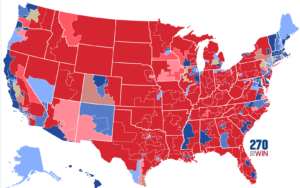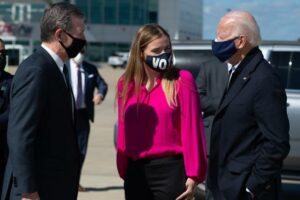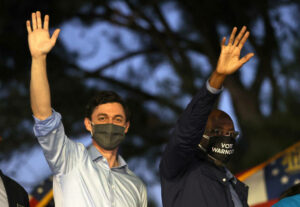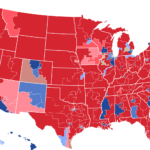While federal elections take the spotlight in a Presidential year, twelve states will vote for their next governor in the 2016 elections. Here is your cheat sheet on 2016 Gubernatorial elections. I’ll be rating the races on a scale ranging from Safe Dem to Safe Republican.
Safe Democratic: Delaware, Washington and Oregon
Delaware is set to elect the state’s at large member of Congress, Democrat John Carney and should do so handily over Republican Colin Bonini. Delaware is a safe Democratic state, and Carney is well liked with high name id.
Former Seattle Port Commissioner Bill Bryant (R) stepped up to run against Democratic incumbent Jay Inslee in Washington. Washington is a blue state, and with Inslee a relatively well liked governor who has avoided any major problems during his term, he should curse on party id alone.
In Oregon, Dr. Bud Pierce (R), a first time candidate who previously ran Oregon’s medical commission, is making a valiant effort against Democrat Kate Brown, and while his efforts may be saving the state’s Republican party as a functional political force, he’s still unlikely to knock off Brown. Democrats will win Oregon by a large margin, and she should as well, despite this being a special election to the continue the term of scandal plagued Democrat John Kitzhaber, who resigned. Brown is already serving as the nation’s first bisexual governor.
Likely Democratic: Montana
A red state at the federal level, Montana really should be in play for Republicans, but that doesn’t seem to be the case. Businessman Greg Gianforte (R) has a lot of money, but has failed to get much traction against Democratic incumbent Steve Bullock. Bullock’s strong fundraising and Gianforte’s personal wealth have made this race extremely expensive, with over 15 million spent. The incumbent Bullock is well liked and should get enough cross over votes to win. Gianforte is close with Montana’s social conservative wing, which is not a majority in the state. He has failed to win a public poll this election. Bullock has governed as a populist, in the vein of former Democratic governor Brian Schweitzer, and his popularity has remained strong.
Safe Republican: Utah, North Dakota
In blood red Utah, governor Gary Herbert (R) cruised through his primary and is up against a sacrificial lamb Democrat, healthcare exec Mike Weinhotlz. Despite Weinholtz being a serious candidate with a serious resume, there is no way Herbert loses re-election. In North Dakota, software executive Doug Burgum (R) has never held elected office before but even some of the state’s Democrats are backing him against State Rep, Marvin Nelson (D), North Dakota is a conservative state, and Nelson hasn’t gained any traction.
Leaning Republican: Vermont, New Hampshire
New England has trended from red to blue over the decades, but at the state level, a GOP resurgence seems to be taking place this year. In Vermont, one of the bluest states in the nation at the federal level, the GOP got a recruit in Lt. Gov Phil Scott, and his moderate approach has allowed him to build and maintain a lead against former state transportation chief Sue Minter. Vermont has had Republican governors many times before, but it’s still quite a shock that Scott looks set to win a state that will overwhelmingly back Democrats in federal races. Minter has struggled to find her footing in the race, and issues with the state’s healthcare system have hurt Democrats locally.
Democrats pushed Democratic governor Maggie Hassan to run for Senate, and in the process, it may have cost them the Governorship in New Hampshire. The Republicans got a strong recruit in Chris Sununu, the son of former Governor and Bush confidant John Sununu. Democrats had a splintered field and ended up selecting business executive Colin Van Ostern in their primary.With Trump and Ayotte trending up a bit in recent weeks in New Hampshire, it makes it more likely that Sununu, who has a well known name in the state, will be able to get past Van Ostern. Most polls, including most recent ones, have shown Sununu with a clear, but small lead.
Leaning Democratic: West Virginia, Indiana
West Virginia keeps getting more and more red, but Democrats have remained highly competitive at the state level, and by recruiting coal baron Jim Justice, the state’s richest man, they ensured they opted for a candidate with plenty of money, and a lot of name recognition. Justice is extremely controversial, as he formerly donated to Republicans, does not endorse Democrats outside of WV, and has racked up a litany of unpaid taxes and safety fines with his companies. However, he’s also the Democrats version of Donald Trump this cycle, a charismatic, and successful businessman, with a huge ego, and a questionable ethics record. Given Trump’s popularity in West Virginia, Justice is in a good position to win.
The GOP went with state senate president Bill Cole. Cole backs Trump and has done his best to pry traditionally Democratic voters over to the Republican side, suggesting to voters that their values better match the GOP. He evan backs Medicaid expansion in a bid for the state’s poor voters. However, Cole simply lacks Justice’s wit and charisma, and thus Democrats are the favorite in this race. Current Democratic Governor Earl Ray Tomblin is popular, just like Justice backer Joe Manchin, and Cole’s support of a “right to work law” for West Virginia is not universally popular either.
The Green party ran a credible candidate in former state legislator Charlotte Pritt, Pritt has gotten some major endorsements and many of the state’s progressive Democrats are backing her given Justice’s anti progressive views. Still this is West Virginia and it will be an accomplishment if she gets above 15%. A lot of political experts have this race either as a toss-up or learning towards Cole, but the feeling on the ground is that Justice is ahead.
In Indiana, Trump’s selection of Governor Mike Pence probably helped him lock down the state in the Presidential race, but it threw the Governor’s race wide open, and has allowed Democrat Judd Gregg, who surprisingly came within three points of Pence in 2012, to build a steady lead in the Hoosier state. Gregg is a charismatic politician who has focused on local issues, and with Democrats competing in two races statewide (the other being the Senate race), turnout should be strong enough in places like Indianapolis and Gary, for him to win. Lieutenent Governor Eric Holcomb was a late draftee for the Indiana GOP, and he lacks the name recognition that Gregg already has from a previous statewide run. Indiana suffered the fallout of a religious freedom bill backed by Pence, and Gregg’s focus on the economy should see him earn a narrow win, something that would be a big bright spot for Democrats.
Toss-Up: North Carolina, Missouri
In North Carolina, the state’s governor’s race should come down to whoever wins the Presidential and Senate races in the state that also take place this year. Attorney General Roy Cooper (D), has built up his name recognition to the point that this race is tight as a tick with incumbent Republican Pat McCrory. McCrory has been criticized for his efforts to curtail voting rights in the state, and also his support for an anti-transgender “bathroom bill”, and RFRA legislation, that has cast North Carolina in a bad light nationally, and resulted in economic harm to the state. Cooper is a moderate, who is focused on jobs and the economy. This has been an expensive race, and most voters will go with the party line they prefer. If Trump and Burr can win North Carolina, McCrory should too, but if I had to decide today, I’d go with Cooper, as the Democratic vote should be strong enough to earn him a very narrow victory.
In Missouri, another Democratic attorney general, Chris Koster, is mounting a strong challenge for the state’s chief executive. Koster is running in an open seat race to replace incumbent Democrat Jay Nixon, and his Republican opponent is Iraq War veteran Eric Greitens. Missouri is a red state, but it has voted for Democrats at the state level, and Koster is better known and has more experience in government than Greitens. He’s also a moderate who has earned key backing from groups like the NRA that rarely endorse Democrats. Koster is going to beat the red wave, and I think this will be the nation’s closest race, but in large part due to Nixon’s popularity, I see him getting through by his fingernails.
My predictions in map format are below, stay tuned for my predictions for the House, Senate, and of course the Presidential race.
Main Photo:












